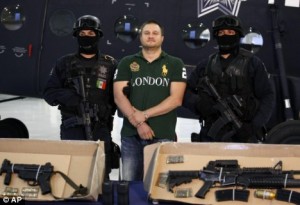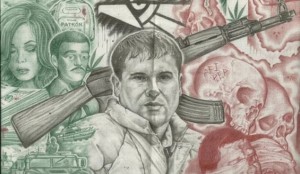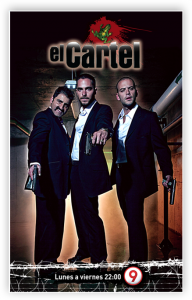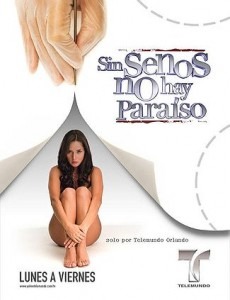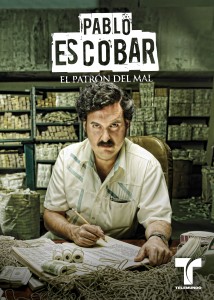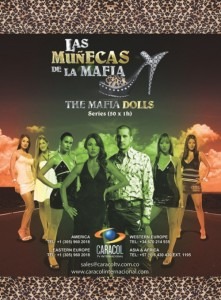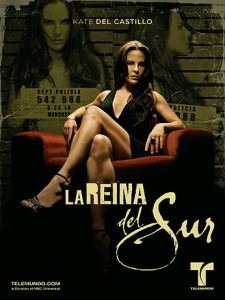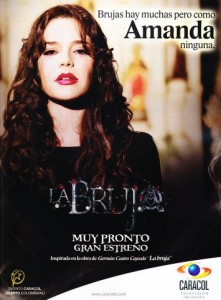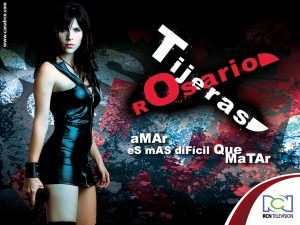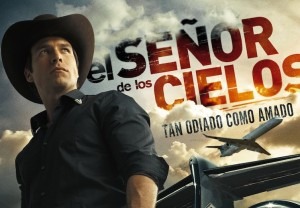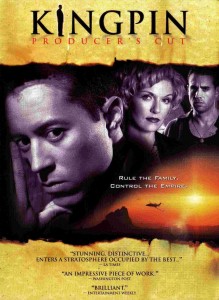And so the show began. No stacks of cash, no confiscated drugs, no high-caliber weapons…at least none belonging to El Chapo. Following a preamble from Mexico’s Attorney General, applauding the planning, inter-agency coordination, and transnational cooperation that went into executing the “megaoperativo,” Joaquín Archivaldo Guzmán Loera, better known as El Chapo Guzmán, was briskly escorted from an adjacent hanger to the Blackhawk helicopter waiting to transport him to a maximum security prison. The scene lacked the theatrics of previous high profile arrests, such as that of “La Barbie” Edgar Valdez, but the myth and reputation of El Chapo were more than enough.
His rags to riches story has become contemporary Mexican folklore, as tales of how he grew up poor in rural Sinaloa mingle with his rise to power as the head of the Sinaloa cartel. Further fueling this reverence for the drug lord are the countless corridos written in his honor, touting his craftiness and bravura in confronting the State, the authorities, and rival cartels. Adding to the mystique are titles bestowed upon him by outside agencies, such as Forbes magazine and the DEA calling him the world’s most powerful drug trafficker and the Chicago Crime Commission naming him Public Enemy Number 1, a title previously held by Al Capone.

As the political and judicial dramas begin to unfold, we are left to wonder how the apprehension and possible extradition of one of the most sought after criminals in the world will be woven into the popular narrative of the drug trade. In the wake of more than three decades of trafficking, money laundering, murders, corruption, and evasion, how will the story of El Chapo be told? In popular media, the last decade has shown a boom in the production of «narco» themed telenovelas from throughout Latin America. Borrowing from both fiction (novels written about the drug trade) and real-life events, these telenovelas have quickly become one of the preferred means of culturally approaching narratives of the drug trade. As expected, the story of El Chapo has proven no different, as Univision has already acquired the rights to broadcast El Varón de la Droga, a new telenovela based on the life of El Chapo Guzmán. This news comes after last year’s announcement of the network’s intention to air the Spanish-language adaptation of Breaking Bad, to be called Metastasis. The script is being written by Andrés López López, who also penned the successful El cartel de los Sapos and Las Muñecas de la Mafia series and spent time in a U.S. prison for his participation in the Norte del Valle cartel. While the popularity of this medium as a means of entertainment has proven a successful formula for producers, the efficacy of the narco-novela as the appropriate vehicle for remembering, dialoguing with, and understanding the world of the drug trade remains questionable. Can these shows fully translate and negotiate the complexities of this organized crime without glorifying the stereotypical aesthetics of the drug trade or silencing the unsung victims of the system of violence generated both by and against the narcotics trade? Perhaps only time and Univision will tell how the exploits of El Chapo will be translated for the small screen.
For those who may be unfamiliar with this particular genre of telenovela, I offer the following for further research:
El cartel de los Sapos – Adapted from the novel by Andrés López López detailing his activities in the Norte del Valle cartel
Sin tetas / cenos / pechos no hay paraíso and El Capo – Fiction, both adapted from novels written by Gustavo Bolivar
Pablo Escobar, El Patrón del Mal – Adapted from La parabola de Pablo by Alonso Salazar detailing the life of Pablo Escobar
Las Muñecas de la Mafia – Fiction, adapted from the novel by Juan Camilo Ferrand and Andrés López
La Diosa Coronada – Script written by Juan Camilo Ferrand based on the life of former beauty queen turned trafficker Angie Sanclemente Valencia
La reina del sur – Fiction, based on the novel by Arturo Pérez-Reverte
La bruja – Non-fiction, based on the book by Germán Castro Caycedo
Rosário Tijeras – Fiction, based on the novel by Jorge Franco
El señor de los cielos – based on the life of famed trafficker Amado Carrillo Fuentes
And, lest we forget, NBC’s 2003 contribution to the genre, Kingpin

